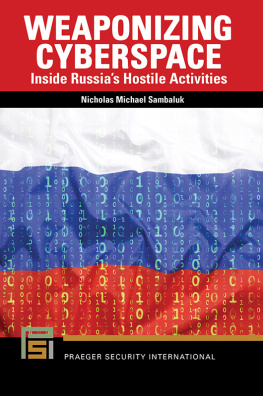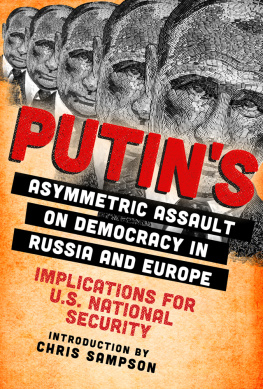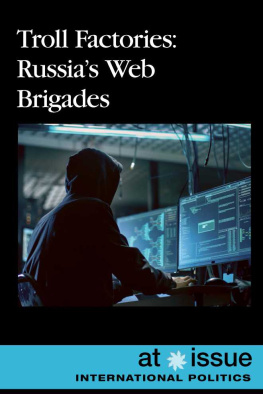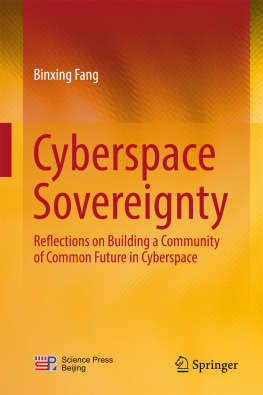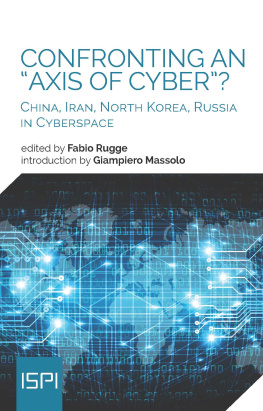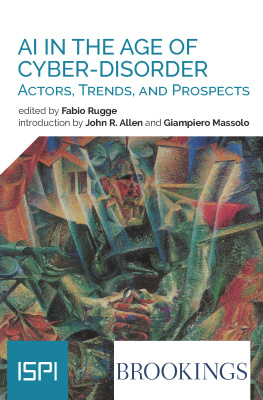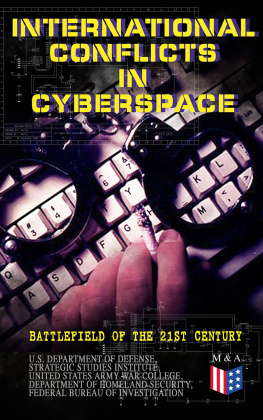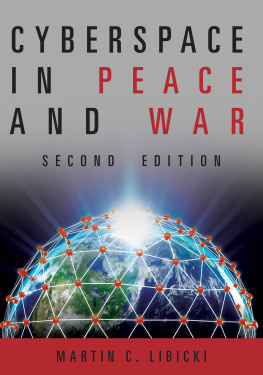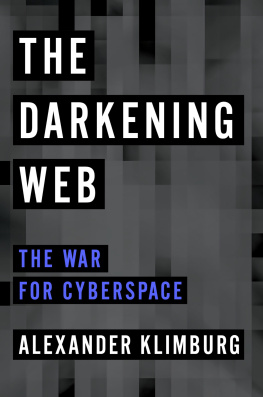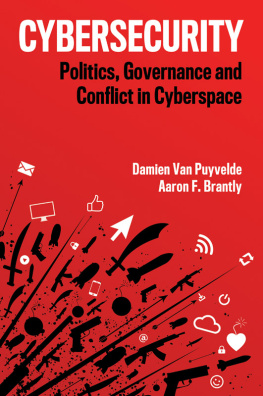In Praise of Weaponizing Cyberspace
Sambaluk weaves here an impressive history and analysis of the Russian governments cyber activity and its underlying motives. Taking us inside the Kremlins well of paranoia and antagonism towards the West and post-Soviet democracies, Weaponizing Cyberspace shows us why, how, and towards what objectives Russian cyberoffensives will continue. Sambaluk also explains, convincingly, why these activities are likely to escalate.
Tom Rogan, National Security Columnist, The Washington Examiner
Penetrating analysis from a proven military science and technology expert, Weaponizing Cyberspace provides first-ever insights into the minds and rationale behind Russias offensive cyberspace operations.
Colonel (Ret.) Gregory Conti, Principal and Co-Founder, Kopidion
Weaponizing Cyberspace
Inside Russias Hostile Activities
NICHOLAS MICHAEL SAMBALUK
Praeger Security International

Copyright 2022 by Nicholas Michael Sambaluk
All rights reserved. No part of this publication may be reproduced, stored in a retrieval system, or transmitted, in any form or by any means, electronic, mechanical, photocopying, recording, or otherwise, except for the inclusion of brief quotations in a review, without prior permission in writing from the publisher.
Library of Congress Cataloging-in-Publication Data
Names: Sambaluk, Nicholas Michael, author.
Title: Weaponizing cyberspace : inside Russias hostile activities / Nicholas Michael Sambaluk.
Description: Santa Barbara, California : ABC-CLIO, LLC, [2022] | Series: Praeger security international | Includes bibliographical references and index.
Identifiers: LCCN 2021038744 (print) | LCCN 2021038745 (ebook) | ISBN 9781440876912 (hardcover) | ISBN 9781440876929 (ebook)
Subjects: LCSH: CyberterrorismRussia. | CyberspaceSecurity measures. | Computer crimes.
Classification: LCC HV6773.15.C97 S355 2022 (print) | LCC HV6773.15.C97 (ebook) | DDC 363.325dc23/eng/20211027
LC record available at https://lccn.loc.gov/2021038744
LC ebook record available at https://lccn.loc.gov/2021038745
ISBN: 978-1-4408-7691-2 (print)
978-1-4408-7692-9 (ebook)
26 25 24 23 221 2 3 4 5
This book is also available as an eBook.
Praeger
An Imprint of ABC-CLIO, LLC
ABC-CLIO, LLC
147 Castilian Drive
Santa Barbara, California 93117
www.abc-clio.com
This book is printed on acid-free paper 
Manufactured in the United States of America
The conclusions and opinions expressed in this manuscript are those of the author and do not necessarily reflect the official policy or position of the U.S. Government, Department of Defense, or The Air University.
Contents
Current events topics are necessarily moving targets, and in this particular case, the current events boldly underscore the urgent need for this book. The bulk of the manuscript was completed by the close of 2020, in the immediate wake of the discovery of the SolarWinds espionage campaign. The release of a declassified version of a major U.S. intelligence community report in March 2021 prompted readjustment to some specific elements to identify the conclusions and perspectives that the report enunciated. But hostile and nefarious cyberspace activities suspected to emanate from Russia proceeded apace, and in the first months after the completion of the manuscript, the United States was subjected to the infrastructure stoppage of Colonials pipelines that would ordinarily delivery nearly half of the petroleum products used by the U.S. eastern and southeastern states. Service returned when about $5 million in ransom was paid to hackers that analysts concluded operated with impunity from Russia.
The new president Joseph Biden, in the weeks following the Colonial Pipeline ransomware (and just days before another ransomware attack also said to have been of suspected Russian criminal origin briefly interrupted a large part of the meat processing industry),
Russian actions have demonstrated a keen ability to inflict pain in diverse ways. This has apparently included the recent exploitation of U.S. physical reliance and infrastructure vulnerabilities through the use of criminal ransomware. It also entails the use of official comments on U.S. domestic affairs topics, primed to fuel internal dissention and recrimination regarding issues that are sore points in part because of digitally vectored information operations. On the U.S. political left, Lavrovs comments seemingly certify what some partisans have for years insisted: that the Kremlin is occupied by the ally or even the keeper of the Republicans most recent standard bearer. On the U.S. political right, Lavrovs statement casts a foreign (and in particular, an adversarial) flavor on another assertion that has also gained momentum in recent years: that the political left, media outlets, and Big Tech have formed a bloc bent on censoring and even persecuting their opponents. In an atmosphere of mistrust, barbed statements can encourage the suspicions and furies on multiple sides of a divisive subject. Thus, a short statement by a top Kremlin official can sharpen and exploit bad feeling that already exists, which had in some measure been previously fostered and fed by earlier Russian information campaigning.
Effectively countering Russias concerted and multifaceted adversarial activities in the digital realm depend on a principled and unwavering commitment to identify and counteract foreign adversarial actions, whether they are technical or psychological in form. Just as much, it depends on the same degree of principled commitment, among all sides, in resisting the temptation of trying to bundle domestic political opponents ipso facto with invidious foreign powers.
Relatively early in Americas involvement in World War II, General Dwight Eisenhower famously noted that anger cannot win, it cannot even think clearly. A later President, Eisenhower, striving to shape security policy in the new space domain, intrigued me and was the subject of my dissertation and first book. Many of his ideas carried real merit, and this particular quotation may be among his most important.
Indeed, fury, frustration, and confusion are not synonymous with one another but the borders between them can be porous. One of the most noticeable avenues through which Russian agents utilize cyberspace is to sow and nurture disinformation that widens fissures and embitters grievances. But, as this book explores, this is hardly the only vector of the threat. Although many trends suggest that Russias rulers face serious and even potentially mortal challenges in the form of terminal demography and an unsustainable gaming of economics and information, this does not lessen the dangers that the regimes activities pose in the near and medium term. Arguably, the unrelenting nature of the regimes most inexorable challenges sharpens the regimes sense of vulnerability, magnifying its impulse to resort to destabilization and maleficent activities. This is described in the early chapters of this book.
The point is that, under the circumstances, a wounded bear is every bit as dangerous in the near and medium term as a healthy bear. For these reasons, among others, I was gratified by the request from Praeger Security Internationals representatives to follow my recent book,

